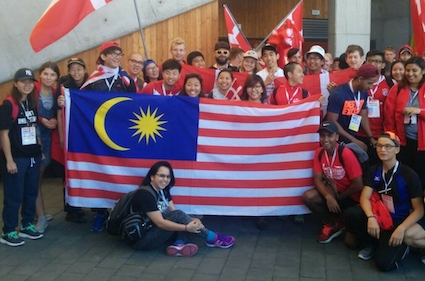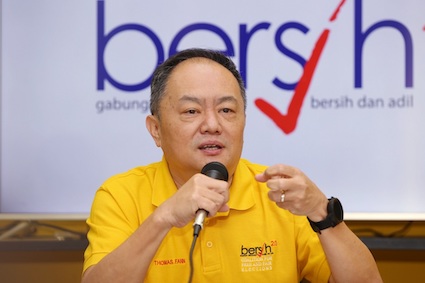
In the 2018 general election, BN won four million votes against 5.5 million for PH and two million for PAS. This time around, in a (yet again) three-corner contest, PH may win almost half the votes with the other half split between BN and the others. Hence no one will have enough seats to form the government.
NO HOLDS BARRED
Raja Petra Kamarudin
First read the news report below.
There are an estimated two million Malaysians living overseas. And the majority of these two million overseas Malaysians are anti-government — in this case anti-Umno and anti-Barisan Nasional.
In the May 2018 general election, so many overseas Malaysians wanted to come back to Malaysia that there were not enough flights. Air Asia complained that they tried to increase the number of lights but could not get government approval. If not, Umno-BN would have lost the GE14 even worse than they did.
Bersih expects GE15 to be a ‘hung parliament’. That would mean whoever wins the general election will need to form a ‘unity government’. If not, no one may be able to form the government — or the government will be unstable with a razor-thin majority of probably less than 2% of the seats.
And that means it would take only a couple of MPs to resign or cross over for the government to fall.
To avoid this instability, Bersih says the government needs to reform the electoral process to make it easier for the two million overseas Malaysians to vote. That would mean whoever wins the general election would do so with a comfortable margin.
Considering that the two million overseas Malaysians are anti-government, that would mean Pakatan Harapan is going to win GE15 — with the help of two million overseas Malaysians — and will win with a comfortable margin. That, more or less, is what Bersih is saying.
Then we have the four million or so new voters or the ‘undi-18’ first-time voters. The majority of their votes are expected to go to the opposition.
With the two million overseas voters and the four million new voters, that would be six million ‘hostile’ voters. And considering that about 75-80% of the registered voters turn out to vote, that would be 4.5 million or so votes, with about three million going to Pakatan Harapan.
In the 2018 general election, BN won four million votes against 5.5 million for PH and two million for PAS. This time around, in a (yet again) three-corner contest, PH may win almost half the votes with the other half split between BN and the others. Hence no one will have enough seats to form the government.
**********************************************************************************

(MMO) – The Coalition for Clean and Fair Elections (Bersih) said reforms to postal voting for overseas voters should be carried out without delay, as the 15th general election (GE15) is expected to be a closely fought contest.
The watchdog added that this would avoid the formation of a government with a slim majority, which in turn could lead to disruptions in policy making and the passing of Bills, and even a confidence vote in Parliament.
Bersih chairman Thomas Fann said the nearly two million Malaysians abroad will play a key role in the upcoming elections which could happen at any time.
“The expansion of absentee voting to Malaysians overseas is considered done but what’s important now is since they have the right to vote, potentially two million of them, the (Election Commission) must reform the postal voting process to allow them to apply to be postal voters.
“We call for the application to open immediately since elections can be imminent. No reason for the EC not to open them now,” said Fann during the launch of Bersih’s annual report today.
“If we give them enough time to apply and enough publicity from the EC, media and civil society, we could see several hundred thousand applying to be postal voters and that is where the EC needs to reform this process so it can process all these applications efficiently and effectively.
“Otherwise, if they maintain the current process of manually printing out ballots and envelopes after Nomination Day, they can do no more than 10,000 applications, which would render this right given to overseas voters totally meaningless.”
Bersih also highlighted today seven achievements on electoral and institutional reforms in 2021.
Key among them was its efforts with six other civil society organisations calling for the lifting of the state of emergency declaration established during Tan Sri Muhyiddin Yassin’s tenure as prime minister in response to the Covid-19 pandemic.
The group filed an originating summons at the High Court on February 2, 2021 to seek declarations on the role of Parliament and the judiciary during the state of emergency. It was eventually lifted on July 21, 2021.
Bersih had also campaigned for the reopening of Parliament. Muhyiddin’s government lifted the suspension and resumed a special sitting from July 26 until August 2, 2021.
Bersih also had a hand in the signing of the memorandum of understanding (MoU) between Prime Minister Datuk Seri Ismail Sabri Yaakob’s government and the Opposition to avoid further political disruptions and bring some stability to the economy and country’s administration.
“Bersih has criticised unequal allocation of CDF (Equitable Constituency Development Fund) to elected representatives as it may be used as incentive for party hopping. In March 2021, Bersih and the Institute for Democratic and Economic Affairs (IDEAS) published a research paper on the policy of CDF in Malaysia with reform recommendations.
“When Ismail Sabri signed the MoU with Pakatan Harapan, one of the terms of the agreement was that PH MPs would receive equal CDF as government MPs. We called for it to be given to non-PH MPs but to no avail.
“Nonetheless, our campaign and critique has mainstreamed the concept of equitable CDF,” said Fann.
The last two key reforms that Bersih managed to implement were Undi18 and automatic voter registration as well as the anti-party hopping and recall law which were included in the MoU.



No comments:
Post a Comment
Note: Only a member of this blog may post a comment.